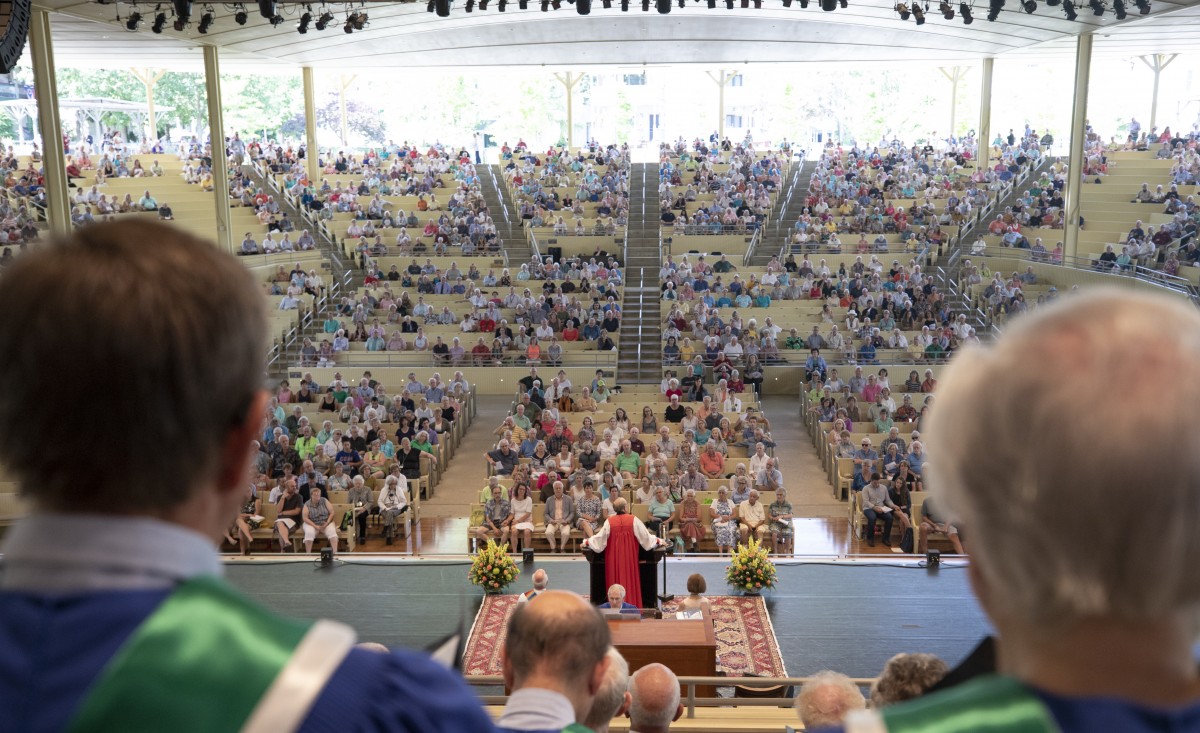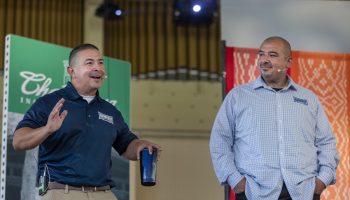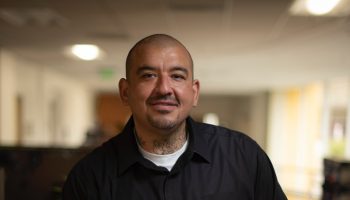Many Buddhist texts begin with this line, ‘O nobly born, remember who you really are,’ ” said Fr. Greg Boyle, S.J. at the 9:15 a.m. Tuesday morning worship service on July 17 in the Amphitheater.
His sermon title was “ … and the soul feels it worth,” and his Scripture text was Matthew 8:5-13, the healing of the Centurion’s servant.
The Centurion, in Matthew’s story, told Jesus that he was not worthy to have him in his home. All Jesus needed to do was say a word, and the servant would be healed.
“We stare at the cure and the faith (in the story), but what Jesus really said was remember who you really are, because God is not about worthiness,” Boyle said.
He quoted Meister Eckhart, who asked, “How long will grown men and women be in their coloring books, coloring images of God that make them sad?”
“Before my mother had eight kids, with the cooperation of my father, she was an opera singer,” Boyle said. “We did not know that until we found a record of her singing ‘O Holy Night,’ and she had a magnificent voice.”
Key words in the carol’s first verse are, “Long lay the world in sin and error pining, till he appear’d and the soul felt its worth.”
“‘ … and the soul felt its worth,’ is about Jesus and Christmas, and it is the job description of everyone here,” Boyle said. “There is a Sufi saying that we are the ‘mirror in which God sees God’s self.’ ”
Boyle told the congregation that God is not raising the issue of worthiness.
“Why are we?” he asked.
Janette was a trainee at Homeboy Industries who was very shy and one day asked to see Boyle, the first time she had ever done so.
“G, I texted you, and you didn’t get back to me,” she told him. “If you don’t text me back, I think you are mad at me.”
Boyle told her it was impossible for him to be mad at her.
Later that day, he was speaking to a large confirmation class in a church in Los Angeles. As he waited to be introduced, he was replying to the Homeboys and Homegirls who had texted him.
After his speech, a woman came up and told him she was disappointed in him because he was texting. Boyle was taken aback as the texting was about the kinship he had with the Homeboys and Homegirls.
He said that he hates autocorrect because it changes the message. He was texting Bertha, a Homegirl who asked where he was, and he told her that he was talking to some nuns.
“Autocorrect changed it to ninjas,” Boyle said. “Bertha thought that was cool.”
Another Homie texted asking for $100 to help pay the rent. Boyle texted that “things were tight.” Autocorrect said, “thongs are tight,” and the Homie got back to him, “Sorry to hear that, what about my rent?”
The woman at the confirmation class was upset because Boyle was sitting in front of the tabernacle, where the reserve communion elements are kept.
“I was just texting my Homies and Homegirls so they will remember that they are the tabernacle,” Boyle said.
Our problem, Boyle told the congregation is, “we don’t know how good we are.”
An interviewer once asked the Dalai Lama his thoughts on self-hatred. The Dalai Lama looked perplexed, and the interviewer asked the question again. He still did not understand and asked his interpreter for a translation. He still did not understand and said, “Everyone of us has a Buddha nature.”
“When we are exiled from ourselves, sadness envelops us, and it is vital to remember who we really are,” Boyle said.
Boyle had a relationship with a gang member called Magoo. To say they never got along would be an understatement. Magoo was assigned to do community service at the Dolores Mission.
“I don’t have to do what you say,” he told Boyle.
When Hector, a member of Magoo’s gang, was murdered, Boyle organized the funeral. Magoo walked out in the middle of the service as Boyle implored those in attendance to honor Hector by putting down their guns and working for peace.
Boyle went to break up a fight between Magoo and one of his gang members, Chino. Magoo pulled a gun and threatened to shoot Chino and Boyle.
“You get a sense of our relationship,” Boyle said.
Magoo got out of prison after 10 years and came to see Boyle.
“We hugged each other because we had known each other for 20 years,” Boyle said.
Magoo asked to talk with him, man-to-man.
“I have never disrespected you,” Magoo said.
“What about the time you walked out on me at the funeral or drew a gun on me?” Boyle replied.
Magoo looked perplexed and said, “Besides that.”
They laughed together, a laugh that “comes from the stomach,” Boyle said.
Magoo said that he spent 20 years building up a reputation and regretted even having one. He cried and sobbed.
“What do I do now?” Magoo said. “I know how to sell drugs and gang bang. I know how to drive, but I don’t know how to park or change the oil in my car. I only know how to wash my clothes in a sink in my cell.”
As he began to work at Homeboy, Magoo said, “Homeboy returned me to myself.”
He was always there, Boyle said. He just didn’t know it.
“To paraphrase Obamacare, your goodness is a pre-existing condition,” Boyle said. “The truth in love and goodness always awaits discovery. Let go of feeling like there is something fundamentally wrong with you.”
When First Lady Laura Bush wanted to visit Homeboy Industries in 2005, the Secret Service wanted a list from Boyle of “everyone who would be within hand-shaking distance of her.”
When Boyle gave them the list, they returned and said that everyone on the list was a felon, like it was a surprise.
“That is sort of the idea at Homeboy,” Boyle said, and through Bush’s visit, “they felt their worth.”
Bush sponsored a conference at Howard University and invited Boyle to speak and bring three Homeboys with him. They would also go to the White House after the dinner.
“There have certainly been crooks living in the White House,” said Boyle, “but this was the first time gang members came to dinner.”
Gabriel, Gus and Herbie were chosen to go on the trip, and Boyle took them to buy suits.
“Every salesperson at Men’s Wearhouse rushed to help us … to the door,” Boyle said.
At the time, Gabriel was the premier tour guide at Homeboy. He would take visitors around and show them where the job placement managers worked, helped visitors put on goggles to watch tattoos be removed and put on hairnets to watch former enemies make croissants together.
“Damn, G, I am already pinching myself,” Gabriel told Boyle. “I’m in a suit going to dinner at the White House.”
At the White House dinner, Gabriel tried some fingerling potatoes with caviar in them; he quickly spit them out and said the food was “nasty.”
On the plane ride home, Gabriel got up to use the bathroom and did not return for about 20 minutes. Boyle asked him if he had fallen in the toilet, and Gabriel pointed to the flight attendant and said he had been talking to the lady.
“Was that OK?” he asked.
“It depends on what you said to her,” Boyle said.
She had seen Gabriel’s Homeboy shirt and asked a lot of questions about it. He gave her a tour at 30,000 feet, describing how visitors put on goggles to watch tattoos being removed and hairnets to watch enemies bake croissants together.
He told her that “we had made history, three gang members having dinner at the White House and that the food was nasty.” She cried. Gabriel thought he might have upset her.
“She just caught a glimpse of you, who you really are,” Boyle told him. “You are somebody recognized as the shape of God’s heart. People cry sometimes when they see that.”
“ ‘O nobly born, remember who you really are,’ ” Boyle said. “You are the shape of God’s heart. Goodness is a pre-existing condition. Long lay the world in sin and error pining until you appeared and the soul felt its worth. You are exactly what God had in mind.”
Deacon Ed McCarthy presided. International Order of the King’s Daughters and Sons program staff person, Lulu Stribling, read the Scripture. For the choral introit, The Motet Choir changed the words to the song “He is Exalted” to “He is Exhausted” in honor of a story in Boyle’s sermon on Monday. Under the direction of Jared Jacobsen, organist and coordinator of worship and sacred music, the Motet Choir sang “Trinity” by Fred Gramann, based on a poem by George Herbert, as the anthem. The Alison and Craig Marthinsen Endowment for the Department of Religion provides support for this week’s services.




